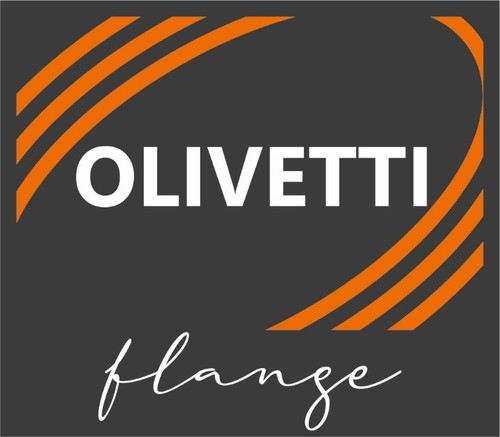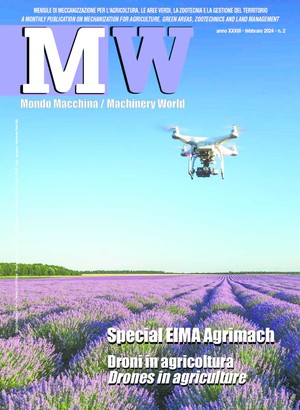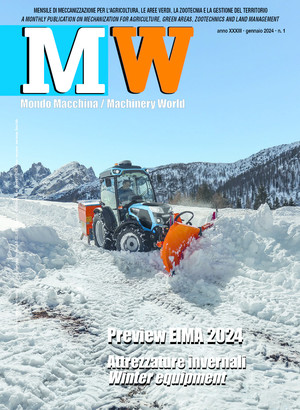
EIMA Energy, the many novelties of the biomass hall
A busy program of initiatives characterises the tenth edition of EIMA Energy, hall dedicated to the latest generation of machinery and the most innovative technologies for the enhancement of biomass and the industrial energy chains connected to them
2024 will be the tenth edition of EIMA Energy, the exhibition organised by ITABIA and dedicated to biomass, which since 2006 has enriched the technological, innovative and informative offer of EIMA International with regard to the machines and equipment used in production chains related to bioenergy and the circular bioeconomy. In about twenty years of initiatives, EIMA “Energy” has always treated issues of great interest with an original and wide-ranging vision, establishing itself over time as a reference point for the transfer of good practices in a strategic sector for the sustainable management of the Italian and international rural (agricultural and forestry) sector. Even the next edition of the show, to be held from 6 to 10 November, comes at a time when the challenges to be faced are many and far from simple.
With COP 28 in December 2023, the governments of almost 200 countries around the world have in fact established the absolute need to face climate change by decarbonising economies globally through a gradual and definitive exit of fossil fuels. In Europe, the Green Deal recognises the entire primary sector a central role in which technological innovation aimed at containing resource consumption and the enhancement of renewable raw materials (circular bioeconomy) can greatly facilitate the achievement of the ambitious carbon neutrality goals expected by the middle of the century. Discussing how to face these challenges, highlighting the many opportunities for economic growth, can therefore facilitate the path towards the objectives set by the European strategy. This requires involving and informing the many farmers who - in the various countries - are contesting environmental measures that they feel are stringent and imposed from above. On the other hand, the energy crisis, exacerbated by the ongoing conflicts, has once again emphasised the importance of renewable energy sources compared to fossil ones, such as coal, natural gas and oil, responsible for high greenhouse gas emissions. Italy, for example, imports just under 80% of its energy needs, mostly covered by fossil fuels, while agroenergy, understood as those obtained from processes and products deriving from agricultural, livestock, forestry and agro-industrial enterprises, are now able to satisfy almost 50% of energy consumption from renewable sources and 8.7% of total energy consumption. Their development and strengthening will make it possible to consolidate new forms of economy based on long-lasting and low-impact production cycles, providing an essential contribution to the reduction of CO2 emissions and therefore to the mitigation of climate change.
In this context, it is certainly useful to continue to spread - with all the tools at our disposal - the full and correct perception of the intrinsic benefits linked to the enhancement of biomass and the energy and industrial chains connected to them. The EIMA in November therefore represents a fundamental stage in raising the awareness of 'insiders' and the general public. The agro-energy exhibition will therefore see an articulated program of informative-disclosing, technical-scientific, strategic-political events concerning the articulated biomass-bioeconomy system. The heart of EIMA Energy's activities is the information on biomass and on the initiatives planned during the event; the stand will be attended by ITABIA technicians and other professionals involved in the dissemination actions, which include, among others, a cycle of 8 technical seminars (2 per day for 4 days) curated by experts in the various fields of biomass use. For these activities, a campaign will also be carried out to involve participants, through the creation and dissemination of edited posters, the collection and dissemination of the speakers' memoirs (presentations and audiovisual), the recording of attendance at events and the drafting of press releases to be disseminated through the ITABIA and FederUnacoma channels. In the case of specific requests, a guided tour will be organised in technological plants for the energy conversion of biomass located near Bologna. This possibility — which would require a half-day trip outside the exhibition — would replace the holding of 2 of the 8 seminars. The spotlight is also on the international workshop entitled “The biomass resource: market and prospects for biomass and renewable sources in the energy sector”, which will involve the “Regional hubs” of bioeconomy created as part of the European Horizon project “RuralBioup”. Then there will be the traditional space dedicated to the dynamic exhibition of operating machines for the wood-energy supply chain, specific for the forestry and agricultural context. A group of CNR-IBE researchers will illustrate (every day for four times) the technical and operational aspects of the technologies on display, thus highlighting the optimisation of yields but also the reduction of consumption and the risk of injury. For this action, a special guide plan will be created with technical information regarding the machines exhibited in the dynamic area.








